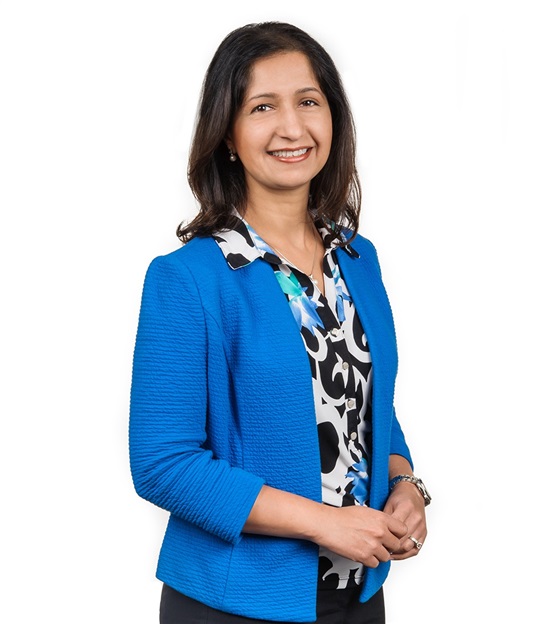TIers put our company’s commitment to citizenship into action every day in their jobs and in their communities. In our ongoing series “CiTIzenship," we feature TIers around the world making a difference in their communities and creating technology for good.
Ritu Vaidya can’t walk by an empty conference room without ensuring the lights are turned off. In fact, making a positive impact is always top of mind for Ritu – whether something as small as recycling papers after a meeting, or on a massive scale leading global initiatives as our Director of Supply Chain Responsibility.
Her job is a relatively new position. While our company has always focused on doing what’s right, being a good citizen required evaluating our supply chain starting in 2010. The U.S. Congress passed the Dodd-Frank Act, which included a provision requiring companies to report on specific minerals used to manufacture their products, where the materials were sourced and whether they were conflict-free. The underlying concern with conflict minerals (tantalum, tin, tungsten, and gold) is that these materials are derived from minerals mined in the Democratic Republic of the Congo (DRC). Many of the mines in the DRC are controlled by illegal armed forces that are helping to fuel war and human rights abuses in the DRC and adjoining countries. As a result of the change in the legal landscape as well as increasing customer demand for responsible supply chains, our supply chain responsibility group was born. With her background in procurement and passion for living responsibly, Ritu was the ideal person to lead the team.
“You see a lot of stories in the news about what the tech industry is doing when it comes to forced labor, pollution and other major issues,” Ritu said. “These issues are very personal to me because I have kids who have to grow up in this environment and live in this world.”
To ensure a clean supply chain, Ritu and her team were faced with a decision – what to do if some of TI’s more than 10,000 suppliers do not meet responsible sourcing standards. Ritu said companies may choose to take the easy way out and let go of any suppliers that do not yet have robust processes in place to ensure responsible sourcing standards. Her team, on the other hand, cares about improving our suppliers in the long-run, and works with them to help source materials responsibly. The end result: the supplier fills the gaps in their systems and stays on as a supplier for us, instead of possibly making questionable supply chain decisions that have a broader negative impact.
“TI is not the kind of company to do things just to check a box. I knew that if I was setting expectations for my suppliers to be responsible, then we needed to be willing to work with suppliers, helping them assess and improve their programs so they can meet our expectations in order to build a stronger and more sustainable supply chain,” said Ritu.
The supply chain team’s approach to responsible sourcing exemplifies our commitment to the well-being of both our suppliers and our communities. The DRC region, where some of our critical manufacturing materials our sourced, is rife with human rights issues. Some companies have stopped buying from the DRC altogether, to avoid the possibility of inadvertently supporting the armed conflict in the region. Doing so, however, is harmful to the workers and families who are abiding by legal supply codes. Ritu believes TI can make a greater overall impact by continuing to purchase from the DRC and support the ethical, legally-compliant mines that exist. Ultimately, Ritu and her team are committed to doing the right thing – for TI, our customers and the community.
“TIers have a very high standard when it comes to ethics and morals,” said Ritu. “We believe in doing the right thing, taking care of the planet, and taking care of our people. Knowing that I work for a company that is committed to these things gives me a great sense of pride.”
In addition to responsible sourcing, Ritu and her team also contribute to our supplier diversity strategy, which focuses on using an inclusive sourcing model that seeks out and enables certified minority- and women-owned business enterprises. Ritu and her team’s hard work does not go unnoticed. This year, MBN’s USA magazine ranked TI on its annual Corporate 101 list, representing the “Most Admired Companies” in supplier diversity. It is recognition Ritu is proud of, but it’s not what motivates her to do this hard and challenging work.
“If there is even a little bit of difference I can make to improve our supply chain, then not only is TI a better place to work, but this world will be a better place for my kids to grow up in,” she said.
To read more about TI’s responsible supply chain efforts and overall commitment citizenship, read our 2014 Corporate Citizenship Report here.

